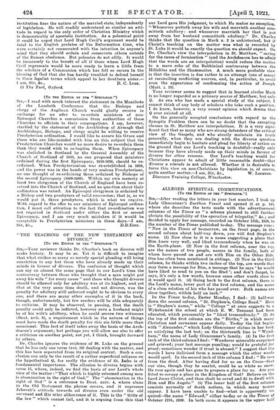" THE TEACHING OF THE NEW TESTAMENT ON DIVORCE."
[To THE EDITOR OP THE " SPECTATOR."]
Six,—Your reviewer thinks Dr. Charles's book on divorce will make history. It may be so. Yet it is difficult to imagine that what strikes so many as merely special pleading will bring conviction to any but those who have already made up their minds in favour of divorce. The confusion of thought which can say on almost the same page that in our Lord's time the controversy between those who thought that a man might put away his wife " for every cause " and those who thought divorce should be allowed only for adultery was at its highest, and yet that at the very same time death, and not divorce, was the penalty for adultery still enforced ought to be obvious to every one, and there are many other examples of it in the book, though, unfortunately, but few readers will be able adequately to criticize. It may be observed, in passing, that the death penalty could only be inflicted, however sure a. husband might be of his wife's adultery, when he could secure two witnesses (Deut. xvii. 6), a requirement which in the nature of things must have made the death penalty for this sin little more than occasional. This fact of itself takes away the basis of the Arch- deacon's argument; but perhaps you will allow me also to offer a criticism on another point, not yet, I think, brought forward by others.
Dr. Charles ignores the evidence of St. Luke on the ground that he has only one verse (xvi. 18) dealing with the matter, and this has been separated from its original context. Such a con- clusion can only be the result of a rather superficial reliance on the hypothetical Q, for really the evidence of St. Wire is of fundamental importance. The allusion to divorce begins with verse 15, where, indeed, we find the basis of our Lord's whole view of the matter : "That which is highly esteemed among men is abomination in the sight of God." The " abomination in the sight of God " is a reference to Deut. xxiv. 4, where alone in the Old Testament the phrase occurs, and it expresses Jehovah's attitude towards ail divorce even under the old covenant and His utter abhorrence of it. This is the " tittle of the law " which cannot fail, and it is arguing from this that our Lord gave His judgment, to which He makes no exception. "-Whosoever putteth away his wife and marrieth another corn- mitteth adultery : and whosoever marrieth her that is put away from her husband committeth adultery." Dr. Charles thinks that the question in Mark x. 2 is unhistorical, but if Christ's teaching on the matter was what is recorded by St. Luke it would be exactly the question we should expect. On Dr. Charles's view the interpolation in St. Matthew, " saving for the cause of fornication " (and the Archdeacon has to admit that the words are an interpolation) would reduce the matter to a mere echo of the Rabbinical controversy between the Hillelites and the Shammaites. A much more probable view is that the insertion is due rather to an attempt (ono of many) at reconciling conflicting sources, and, in particular, to avoid even the appearance of condemning the action of Joseph (Matt. i. 19).
Your reviewer seems to suggest that in learned circles Mark is no longer regarded as a primary source of Matthew, but only Q. As one who has made a special study of the subject, I cannot think of any body of scholars who take such a position. I do know, however, a very recent opinion which denies that Q ever existed at all.
On the generally accepted conclusions with regard to the Synoptic Problem there can be no doubt that the excepting clauses in St. Matthew are interpolations. It is a very signi- ficant fact that so many who are strong defenders of the critical view of the Gospels, and who stoutly maintain its truth generally, when they are dealing with the divorce question immediately begin to hesitate and plead for liberty, of action on the ground that our Lord's teaching is doubtful—really only because they have already made up their minds in favour of divorce for other reasons. Our Lord's teaching would for Christians appear to admit of little reasonable doubt—that divorce a vinculo is not allowed. Whether it is desirable tc force this view on non-Christians by legislation is, of course,
quite another matter.—I am, Sir, &c., W. Loateox. Diocesan Training College, Winchester.


































 Previous page
Previous page